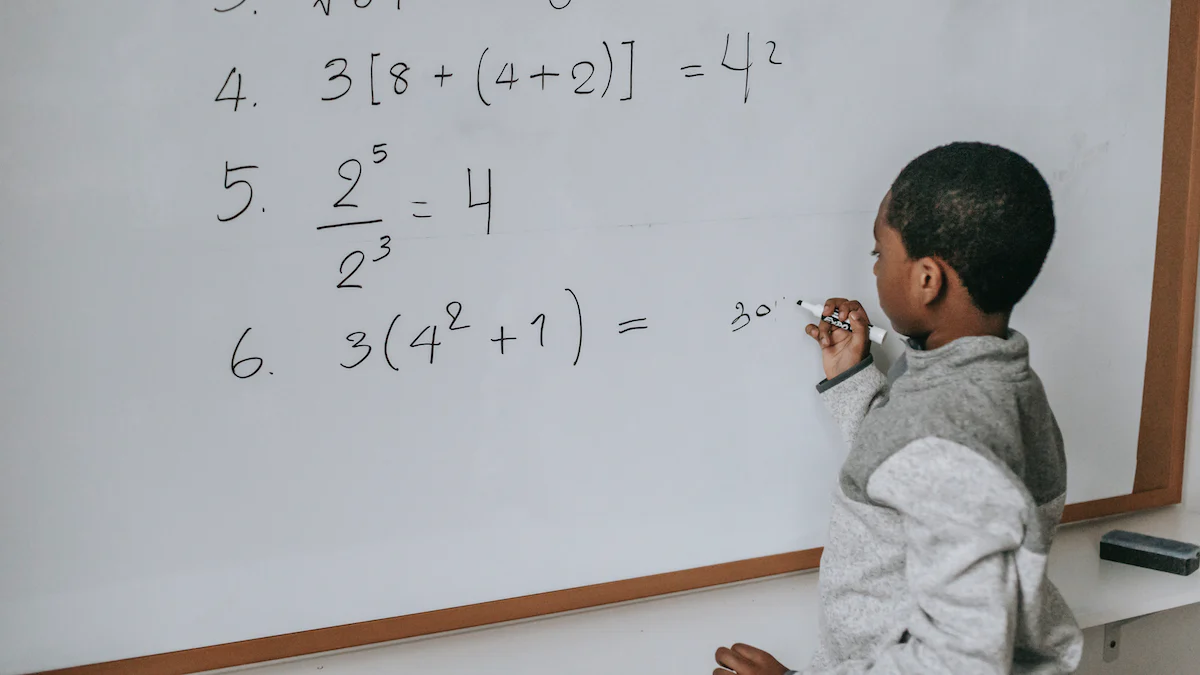Why Study Math?
Mathematics is a crucial subject that holds immense importance in various fields and everyday life. From engineering and finance to computer science and medicine, math plays a fundamental role in solving complex problems and making informed decisions. By studying math, you can develop critical thinking skills, enhance logical reasoning abilities, and improve problem-solving techniques.
Regular practice is highly recommended to become proficient in math. Just like any other skill, consistent effort and dedication are essential for mastering mathematical concepts. By practicing math regularly, you can reinforce your understanding of different topics and build a strong foundation.
Moreover, practicing math helps improve overall understanding and problem-solving abilities. It trains your mind to think analytically, break down complex problems into manageable steps, and find efficient solutions. Whether you're a student preparing for exams or a professional looking to enhance your analytical skills, regular math practice can significantly contribute to your success.
In the following sections of this guide, we will explore step-by-step strategies to help you study math effectively. We will cover everything from reviewing the basics to solving a variety of math problems and seeking help when needed. So let's dive in and discover how you can improve your math skills!
Review the Basics
Mathematics is built upon a foundation of fundamental concepts and formulas. To study math effectively, it is crucial to start by reviewing and reinforcing these basics.
Assess Your Knowledge
Begin by assessing your knowledge and identifying the areas where you feel less confident. Take some time to reflect on your understanding of different mathematical topics. Are there specific concepts or formulas that you struggle with? By pinpointing these areas, you can focus your efforts on strengthening your understanding.
Once you have identified the areas of weakness, it's time to review the fundamental concepts and formulas related to those areas. Go back to your textbooks, class notes, or online resources and revisit the explanations and examples provided. Make sure you understand the underlying principles behind each concept and how they are applied in problem-solving.
Practice Basic Problems
After reviewing the basics, it's essential to practice solving a variety of basic math problems. Start with simple exercises that align with the concepts you have reviewed. This will help reinforce your understanding and build confidence in applying those concepts.
As you become more comfortable with basic problems, gradually move on to more complex ones. Challenge yourself by tackling problems that require multiple steps or involve different mathematical concepts. This will not only deepen your understanding but also improve your problem-solving skills.
Remember, consistency is key when practicing math. Set aside dedicated time each day or week for practicing basic problems. The more you practice, the more familiar you will become with different types of questions and strategies for solving them.
By reviewing the basics and practicing basic problems regularly, you will strengthen your foundation in mathematics and set yourself up for success as you progress to more advanced topics.
Understand the Principles and Formulas
To truly excel in math, it is important to go beyond memorizing formulas and instead focus on developing a deep conceptual understanding of the principles behind them.
Focus on Conceptual Understanding
When studying math, it's crucial to grasp the underlying principles and concepts behind mathematical formulas. Instead of simply memorizing formulas, take the time to understand why they work and how they are derived. This will enable you to apply them more effectively in problem-solving situations.
Developing a deep understanding of how different concepts relate to each other is also essential. Math is often interconnected, with various topics building upon one another. By recognizing these connections, you can see the bigger picture and approach problems from a more holistic perspective.
To enhance your conceptual understanding, engage in active learning strategies such as explaining concepts to others or teaching them to yourself. Break down complex ideas into simpler components and explore real-world examples that illustrate their application. This will help solidify your understanding and make abstract concepts more tangible.
Practice Applying Formulas
Once you have a solid conceptual foundation, it's time to put those formulas into practice. Apply the formulas you have learned to solve problems in different contexts. Work through exercises that require you to use multiple formulas or combine different mathematical concepts.
To further reinforce your understanding, seek out real-life examples where these formulas are applied. This could involve analyzing data sets, calculating measurements for construction projects, or solving financial problems. Seeing the practical applications of these formulas will not only deepen your understanding but also make math more relevant and engaging.
Remember that practice makes perfect when it comes to applying formulas. The more you work through problems using these formulas, the more comfortable and efficient you will become at utilizing them.
By focusing on conceptual understanding and practicing the application of formulas, you will develop a strong mathematical foundation that allows for greater problem-solving flexibility and creativity.
Solve a Variety of Math Problems
To improve your math skills, it's important to expose yourself to a variety of math problems. This will help you develop problem-solving strategies, build confidence, and enhance your overall mathematical proficiency.
Start with Easy Problems
When beginning your journey to solve math problems, it's best to start with exercises that align with your current skill level. These easy problems allow you to practice applying basic concepts and build a solid foundation. By solving these problems correctly and efficiently, you will gain confidence in your abilities.
As you progress and become more comfortable with the easy problems, gradually increase the difficulty level. Challenge yourself by tackling more complex or multi-step problems that require deeper analysis and critical thinking. This gradual progression will help you expand your problem-solving skills while still building upon the knowledge gained from solving easier problems.
Challenge Yourself with Difficult Problems
To truly enhance your problem-solving skills, it's important to push yourself beyond your comfort zone. Attempting difficult math problems can be challenging but immensely rewarding. Seek out advanced problem sets or participate in math competitions that provide a platform for testing your limits.
By engaging with difficult problems, you'll learn new problem-solving techniques and strategies. These challenges encourage creative thinking and foster resilience in the face of complex mathematical puzzles. Even if you don't immediately find the solution, the process of attempting difficult problems will sharpen your analytical skills and expand your mathematical toolkit.
Remember that solving difficult math problems takes time and perseverance. Don't get discouraged if you encounter obstacles along the way. Instead, view them as opportunities for growth and learning.
By regularly exposing yourself to a variety of math problems—starting with easy ones and gradually progressing to more challenging ones—you'll develop a well-rounded set of problem-solving skills that can be applied across different mathematical concepts and real-life situations.
Seek Help When Needed
Mathematics can sometimes present challenges that may require additional support. Don't hesitate to seek help when needed, as it can greatly enhance your understanding and progress in the subject.
Utilize Available Resources
There are numerous resources available to assist you in your math studies. Consult textbooks, online tutorials, and educational websites for explanations and examples that can clarify difficult concepts. These resources often provide step-by-step guidance and practice problems to reinforce your understanding.
Joining study groups or participating in online forums can also be beneficial. Engaging with peers who share a similar interest in math allows for collaborative learning and the opportunity to discuss challenging concepts. Exploring different perspectives and approaches can deepen your understanding and provide alternative problem-solving strategies.
Ask for Assistance
When facing difficulties in math, don't hesitate to ask for assistance from teachers, professors, or classmates. They are there to support your learning journey and clarify any confusion you may have. Seek their guidance when you encounter concepts or steps that you find particularly challenging.
Asking questions is an essential part of the learning process. It demonstrates your commitment to understanding the material thoroughly. Remember that no question is too small or insignificant when it comes to grasping mathematical concepts.
By utilizing available resources and asking for assistance when needed, you will overcome obstacles more effectively and gain a deeper understanding of complex mathematical topics. Embracing a proactive approach towards seeking help will ultimately contribute to your overall success in studying math.
Make Math a Regular Part of Your Routine
To truly excel in math, it's important to make it a regular part of your routine. By incorporating math practice into your daily life, you can reinforce your skills and develop a deeper understanding of mathematical concepts.
Set Aside Dedicated Study Time
Creating a study schedule and allocating specific time for math practice is crucial. Consistency is key when it comes to improving math skills. Set aside dedicated study time each day or week to focus solely on practicing math problems, reviewing concepts, and exploring new topics.
By establishing a routine, you train your brain to be in the right mindset for learning and problem-solving. Treat this scheduled time as non-negotiable and prioritize it just like any other important commitment in your life.
Apply Math in Everyday Life
Mathematics is not limited to textbooks or classrooms; it has practical applications in everyday life as well. Look for opportunities to apply math concepts in real-life situations. Practice mental math during daily activities like shopping or calculating expenses. Estimate distances or measurements when cooking or working on DIY projects.
By actively applying math outside of academic settings, you reinforce your understanding of concepts and see their relevance in the world around you. This hands-on approach helps solidify knowledge and makes learning more engaging.
Additionally, seek out opportunities to engage with math-related hobbies or activities. Solve puzzles, play strategy games, or explore mathematical patterns in art or music. These activities not only make learning enjoyable but also foster creativity and critical thinking skills.
By making math a regular part of your routine—through dedicated study time and practical application—you will continuously improve your skills and develop a deeper appreciation for the subject. Embrace the mindset that mathematics is not just an academic pursuit but an integral part of everyday life.
Continuously Improve Your Math Skills
In conclusion, continuous improvement is key to mastering math skills. Regular practice and review of the basics are essential for building a strong foundation and maintaining proficiency. By developing a deep understanding of principles and formulas, you can confidently solve complex problems and tackle advanced topics.
Remember to seek help when needed and make math a consistent part of your routine. Utilize available resources, ask for assistance from teachers or peers, and actively engage with math in everyday life. By adopting these strategies, you can continuously improve your math skills and unlock new opportunities for problem-solving and critical thinking. So keep practicing, stay curious, and embrace the journey of becoming a proficient mathematician!
CoolArticleSpinner.com is a participant in the Amazon Services LLC Associates Program, an affiliate advertising program designed to provide a means for sites to earn advertising fees by advertising and linking to Amazon.com.










